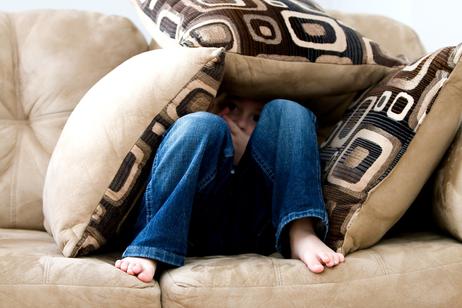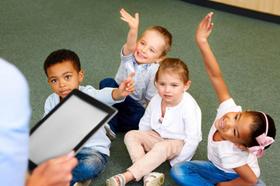After a long and difficult year, there is finally a light at the end of the tunnel. With over 60% of the U.S. population having received at least one dose of the COVID-19 vaccine, things are looking up. COVID restrictions are being lifted, businesses are reopening, and children are returning to school. Though we have much to be thankful for, the scars left behind by a dark and challenging year wonÔÇÖt soon fade.
The COVID-19 pandemic has changed the state of the American public education system in deep and sometimes disturbing ways. Existing disparities between affluent children and low-income students have grown and it may take years of hard work and massive change to overcome them. What many educators are focusing on now as the world starts to return to normal isnÔÇÖt catching students up on lost education in core subjects like math and science ÔÇô itÔÇÖs helping them cope with the stress of a year-long pandemic.
Millions of children around the globe have suffered from a year of isolation from friends and sporadic education. In this article, weÔÇÖll explore the subject of pandemic-related stress and provide helpful tips for parents and educators to support their children in the upcoming school year.
Traumatic Stress Caused by the COVID-19 Pandemic
Adam D. Brown, PsyD, a clinical assistant professor in the Department of Child and Adolescent Psychiatry at NYU Longone discusses the notion of and how the COVID-19 pandemic has affected millions of children in some very negative ways. A traumatic event, Dr. Brown explains, is typically a situation out of our control that cause us to feel our lives ÔÇô or the lives of others ÔÇô may be in danger. Specifically in relation to childhood trauma, a traumatic event can be an upsetting, overwhelming, or frightening experience that challengeÔÇÖs a childÔÇÖs coping abilities.
According to Dr. Brown, the COVID-19 pandemic qualifies as a traumatic event given the fact that it is an unusual and unexpected event that understandably caused worry, stress, and even panic. Many children have had family members get sick or die, not to mention seeing frightening news on TV. How traumatic the pandemic is for a child depends largely on the reaction of caregivers. If a childÔÇÖs caregivers are calm and reassured, the child may have a more positive reaction than if the caregivers are worried and panicked themselves.
Some degree of worry is to be expected, but there are certain signs that indicated traumatic stress, especially as opposed to post-traumatic stress. In many cases, stressors are ongoing. A childÔÇÖs reaction to traumatic stress varies by the childÔÇÖs age and developmental level as well as their degree of social support and their own coping skills.
Here are some signs of traumatic stress, particularly in children 10 and younger:
- Unwanted thoughts and images. The child may experience repetitive images or thoughts and have an increase in nightmares. The child may write, draw, or talk about the event often.
- Negative feelings. The child may struggle with negative feelings such as hopelessness, irritability, sadness, or anger. Some may become overwhelmed by these feelings and react inappropriately to them.
- Avoidance or attention issues. If the child canÔÇÖt avoid the things that remind them of their stress, they may become agitated or distressed. Some children have trouble focusing on schoolwork and other activities.
- Symptoms of reactivity. Some children will startle more easily or experience an increase in headaches, stomachaches, and other physical complaints. They may also have trouble falling or staying asleep or have a change in appetite.
Every child will respond to stress differently, so itÔÇÖs important for parents to be vigilant and to pay attention to changes in behavior. If your childÔÇÖs symptoms persist for more than a few weeks, it may be wise to seek professional help from an adolescent psychiatrist or psychologist.
How Can Parents Help Their Child Cope with Stress?
In times of stress, children often revert to behaviors from their childhood. Children who are potty-trained may suddenly start wetting the bed and children who are normally very independent may become clingy, following their parents around the house. Mary Alvord, a child psychologist who studies trauma and resilience, suggests parents be on the lookout for behavioral changes that affect the childÔÇÖs day-to-day function. If the child exhibits major changes in day-to-day function, itÔÇÖs best to consult a therapist but, otherwise, parents can try a few things on their own.
Here are some ways parents can help children cope with stress:
- Model calm behavior. Children pick up on their parentsÔÇÖ emotions, especially when it comes to stress. They may not understand whatÔÇÖs happening, but they can feel the tension and it may start to affect them. Parents can model calm behavior and take time to relieve their own stress to make the home a more placid place.
- Create stress-free spaces. Create a place in the home where your child can go when they start to feel stressed. It could be a blanket fort, a corner of their room, or even just a comfy chair. Encourage your child to spend some time in this space when they are feeling stressed.
- Keep doing what works. Even as your child develops worrisome behavior, you can focus on the things that are working and provide affirmation. When your child voices their distress, say something like, ÔÇ£You were very upset, but you stayed calm, and we talked about itÔÇØ to teach your child to assert himself.
- Engage your child in open conversation. Sometimes the best thing you can do for your child is give him an opportunity to talk out his feelings. Give your child your full attention and encourage them to speak openly. Respond with honesty and affirm your childÔÇÖs feelings.
- Provide opportunities for interaction. Children need to spend time with others their own age, though that can be challenging at the moment. Set up video playdates or have an outdoor get together with another family where you can stay distanced but still interact.
- Support your childÔÇÖs hobbies. ThereÔÇÖs a lot happening right now that is out of our control which can make children feel stressed. Encourage your child to engage in activities they enjoy to give them a sense of control.
In addition to taking these steps to help your child cope with their stress, think about ways to help your child form a positive view of the future. Talk about the good things that are happening with the vaccine and celebrate forward motion together as a family, so your child sees more than just the bad things.
Tips for Dealing with Negative Behavior
WeÔÇÖve all been anxious and worried over the past year. Even as things are starting to look up, things may not be returning to normal quite as quickly as your child might like. After a year of stress, many children struggle to give voice to their emotions and may exhibit negative behaviors. As a parent, itÔÇÖs important to teach your children discipline but some methods are more constructive than others.
Here are some tips for helping your child manage their emotions and behavior:
- Reinforce good behavior. ItÔÇÖs easy to focus on the bad behaviors and take the good for granted, but part of helping your child manage their emotions and behavior involves recognizing the good behavior. Praise your child when they show good discipline and help them out by setting clear expectations when appropriate.
- Redirect bad behavior. Rather than punishing your child for acting out, take a moment to think about where the behavior is coming from and then redirect it. If your child is acting out, find something else for them to do thatÔÇÖs more constructive.
- Be generous with rewards. Stress is at an all-time high, so you may need to resort to things you wouldnÔÇÖt normally do. Reinforce good behavior with rewards and privileges you might not normally give out ÔÇô something special that will truly motivate your child to manage their behavior better.
- Know when to keep quiet. Sometimes the best thing you can do is not give your child the attention heÔÇÖs seeking when exhibiting bad behavior. As long as your child isnÔÇÖt in danger, simply ignoring bad behavior can sometimes be an effective tactic for stopping it.
- Make use of time-outs. Time-out can be a very effective form of discipline, especially for younger children. Be sure to explain what your child did that earned them the time-out ÔÇô keep emotions out of the equation and keep it simple ÔÇô then keep them in time-out for a specific amount of time. Go for about 1 minute per year of age.
As stressed an anxious as you may be yourself, itÔÇÖs important to never take your own emotions out on your child. Physical punishment is not only ineffective, but it can increase aggression in children. ItÔÇÖs better to teach your child self-control through reinforcing positive behaviors and redirecting bad ones.
How Teachers Are Helping Kids Cope
Parents have been playing the role of caretaker and teacher for the better part of a year but with schools finally returning to in-person education, teachers have their work cut out for them. While itÔÇÖs important to help kids get back into healthy habits regarding their education, it will also fall on the teacherÔÇÖs shoulders to help kids cope with the trauma and stress of a year-long pandemic.
Mental health experts suggest educators build some time into each and every day for students to share their feelings. ItÔÇÖs important to give children an opportunity to share their experience with the pandemic and to give them time to talk about their feelings. Talking about emotions is an important step in learning to manage them. When children have the space and time to explore their emotions, theyÔÇÖll be less stressed and more engaged when it comes time for learning.
Here are some additional tips for educators in helping kids return to school:
- Express understanding and empathy. Every childÔÇÖs experience with the pandemic will be different and some may struggle with challenging emotions like anxiety or anger. Listen to your students and validate their feelings while helping them learn how to cope with them appropriately.
- Avoid empty reassurance. Rather than simply telling your students ÔÇ£everything will be okay,ÔÇØ offer honest encouragement. Acknowledge the challenges or difficult emotions your students are experiencing and give them space to talk about it openly ÔÇô lead them in problem-solving rather than offering empty assurance.
- Encourage gradual change. Avoidance is a natural response to fear and anxiety, but your students wonÔÇÖt be able to move forward if they donÔÇÖt learn to cope with their stress and trauma. Encourage your students to take small steps forward instead of facing their fears in one anxiety-inducing experience.
- Offer praise and reward. Returning to school will come with a lot of uncertainty for many students, so itÔÇÖs important to offer encouragement and praise. Recognize when your students exhibit a beneficial behavior and let them know youÔÇÖre proud of them for it.
- Model good coping skills. Your students learn a lot from you even when youÔÇÖre not consciously teaching, so one of the best things you can do is model good coping skills. Share your own experiences with stress and anxiety as well as your strategies for coping with it.
In addition to taking these steps with your children in school, be communicative with families to help alleviate stress and anxiety. Communicate frequently with parents about changes to school policies or upcoming plans. Be open and available to talk to parents about their childÔÇÖs progress and share the steps youÔÇÖre taking to help your students cope with stress so parents can continue the work at home.
What Help is Available for Schools?
The COVID-19 pandemic has highlighted disparities between affluent and low-income communities and, unfortunately, has widened the gap in many districts. While some districts had the resources and trained teachers to transition into remote learning fairly easily, some districts simply werenÔÇÖt able to offer the same level of education to all of their students. In districts without current technology, students who didnÔÇÖt have access to a computer or tablet may have received hard copies of teaching material. Many districts have been facing declining enrollment and fear among families about potentially returning to full-time in-person instruction in the fall.
Though the pandemic has made it clear just how much the American public school system is struggling, help is available. The American Rescue Plan promises about $122 billion in financial relief for K-12 schools and several policymakers are pushing the Biden administration to emphasize mental health, especially when making decisions about allocating resources for education. in a letter to the secretaries of the U.S. Departments of Education and Health and Human Services, ÔÇ£Not all schools and districts are equipped to work on these complex mental and behavioral health issues to meet the unique needs of todayÔÇÖs students.ÔÇØ
In Washington D.C., one school has partnered with local mental healthcare providers to provide support for both students and parents. By partnering with Medstar Georgetown Center for Wellbeing in School Environments, a Washington D.C. elementary school offers weekly sessions with a clinical psychologist in what they call ÔÇ£parent wellbeing sessions.ÔÇØ Cortez Masto hopes the influx of federal relief dollars will help other struggling districts create beneficial partnerships like this to help parents and students get the mental health support they need.
Mental Health Resources for Parents
Being a parent is never easy, but in the midst of a global pandemic you find yourself wearing many hats. While acting as caregiver, teacher, provider, and more, parents are stretched thin, and it is often the child who suffers. Here are some beneficial resources for parents to help cope with stress and anxiety or to help your children deal with theirs:
Trauma-Focused Cognitive Behavioral Therapy:
A free app for cognitive processing, this app was created through a collaboration between the Allegheny Health Network and Carnegie Mellon UniversityÔÇÖs Entertainment Technology Center and Disruptive Institute. It was designed to help kids build and reinforce healthy coping skills in a fun, accessible way.
This in-depth guide provides information for caregivers and parents about infectious disease outbreaks in their community to help reduce stress and calm anxiety. It helps parents and caregivers learn how an outbreak might affect their family ÔÇô physically and emotionally ÔÇô and teaches coping skills.
Created by the Center for the Study of Traumatic Stress, this document provides guidance for parents and caregivers to have a healthy discussion with children and teens about COVID-19. It includes suggestions for talking to children of different ages from preschoolers through teenagers.
Offers by the Clay Center for Young Healthy Minds, this resource provides guidance for parents and caregivers in helping children and teens deal with the COVID-19 pandemic. It includes detailed guidance for kids by developmental level as well as more general guidance.















